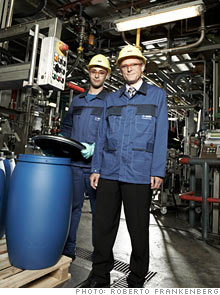Keeping your senior staffers
Hit by a shortage of engineers, BASF found a way to retain older workers.
 |
| Peter Gleich, a BASF plant manager, with a mentee |
(Fortune Magazine) -- With layoffs rampant, holding on to workers ought to be the least of a company's worries -- unless those employees are scientists and engineers. According to the National Science Foundation, nearly 40% of these skilled workers in the U.S. are more than 50 years old, and the pipeline of talent to replace them is shrinking. IHS Cambridge Energy Research Associates predicts a 7% to 11% shortage of experienced engineers in 2011. America is not alone; industrial powerhouses Germany and Japan face similar demographic challenges.
BASF, the German chemical giant, which makes, among other products, ammonia, fertilizer, and plastics, says it has found a way to beat the crunch. The $91-billion-a-year company has been around for more than a century, and its skilled workforce of production managers, scientists, and engineers, while not quite that old, have decades of experience under their belts. By 2020 the majority of BASF's German employees will be 50 to 65 years old. "It's become apparent that we're going to hit a wall," says CFO Kurt Bock, himself a sprightly 50. BASF's demographic problem is bigger than most because it mainly operates in Germany, Japan, and the U.S., where the elderly make up an increasingly large chunk of the population.
While the company is trying to replenish its workforce from the bottom up, even sending its scientists to teach classes in elementary schools, that may only address the problem of 2050. A more pressing concern is the next decade. "If we don't deal with aging," says Hartmut Lang, BASF's HR chief, "we'll face a serious challenge." Three years ago BASF decided to create a series of programs aimed at boosting workers' longevity and productivity.
One initiative focuses simply on maintaining health. Doctors visit laboratories and plants, where they assess the physical condition of individuals who volunteer and offer them advice. Another targets the facilities themselves. In office settings, notes Lang, the company has instituted "ergonomics checks" for furniture. At the plants, managers divvy up labor among different generations to reduce stress on older employees. Peter Gleich, a plant manager in Ludwigshafen, Germany, says, "We're also looking at organization to boost productivity" -- which means putting younger and older people together in teams to take advantage of both generations' skill sets.
Yet even if senior employees work longer and better, they'll have to leave eventually -- and they'll take much of their experience with them. "For the engineers, transferring knowledge to their successors is easier said than done," says Bock. BASF encourages older staffers to take on a mentee. To ensure expertise gets passed on, BASF created teaching sessions called Wissensstafette, or knowledge relay, where older workers share their knowledge with newcomers. It also changed its compensation scheme to reward mentoring. Now 360-degree evaluations are conducted to get feedback from those being mentored -- a rare approach in Germany, where most bonuses are based solely on seniority.
If BASF can unlock the potential of its older workers, its golden years may still be ahead. ![]()
-
 The retail giant tops the Fortune 500 for the second year in a row. Who else made the list? More
The retail giant tops the Fortune 500 for the second year in a row. Who else made the list? More -
 This group of companies is all about social networking to connect with their customers. More
This group of companies is all about social networking to connect with their customers. More -
 The fight over the cholesterol medication is keeping a generic version from hitting the market. More
The fight over the cholesterol medication is keeping a generic version from hitting the market. More -
 Bin Laden may be dead, but the terrorist group he led doesn't need his money. More
Bin Laden may be dead, but the terrorist group he led doesn't need his money. More -
 U.S. real estate might be a mess, but in other parts of the world, home prices are jumping. More
U.S. real estate might be a mess, but in other parts of the world, home prices are jumping. More -
 Libya's output is a fraction of global production, but it's crucial to the nation's economy. More
Libya's output is a fraction of global production, but it's crucial to the nation's economy. More -
 Once rates start to rise, things could get ugly fast for our neighbors to the north. More
Once rates start to rise, things could get ugly fast for our neighbors to the north. More







